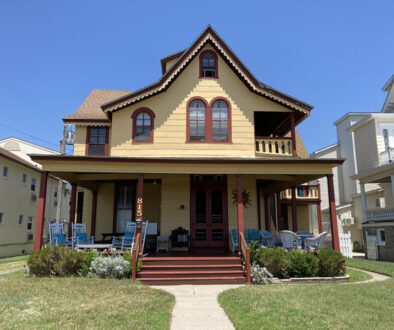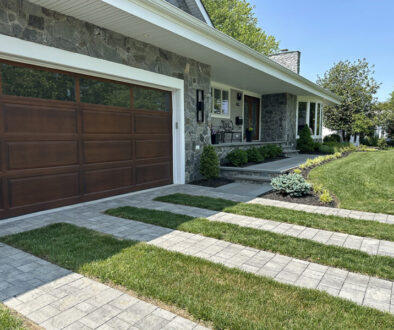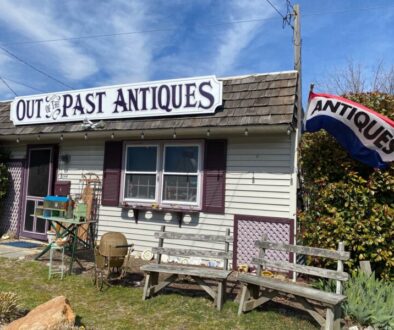Barbara Freels
If it were not already taken, A Tale of Two Cities might be a perfect title for the life story of West Cape May resident Barbara Freels. Born in Harlem in 1923, Barbara spent her childhood between Manhattan and Cape May, often returning to the city during the summer months when New York and Philadelphia crowds flocked to the shore.
Having worked as a dispatcher for Bellevue Hospital, Barbara eventually returned to Cape May with her husband, Chester, to whom she was married for 75 years.
Barbara is a contributor to the recently published book, Black Voices of Cape May – A Feeling of Community, which was produced and published by the Center for Community Arts. Still wearing her birthday sash which read “100 Years Loved,” Barbara sat in her West Cape May living room to share even more of her fascinating life.
If it were not already taken, A Tale of Two Cities might be a perfect title for the life story of West Cape May resident Barbara Freels.


Last year you were asked to contribute to Black Voices of Cape May. What was the one thing you felt was the most important for people to know about you?
That I’m a happy person and I love everybody. I respect everyone and I love Cape May. But I also love New York, where I was born and went to school.
So, you retired to Cape May?
I have four sons. I had a choice of either living in Florida or in Massachusetts, where my oldest son is. This was the home my grandfather got from working on his horse and buggy business back in the 1800s. All this land here (with a sweeping gesture she points in every direction of her neighborhood) was the Miller Farm. He bought the land; it was two large lots.
Can you tell me some more about him and his horse and buggy business?
His business was providing transportation for people arriving in town and getting to the places where they were staying. Well, when the neighbor took a gun and she shot his horse, he had a fit! That horse was his livelihood.
Why did she shoot his horse?
The horse was grazing on her grass. I guess he ate all the grass on my grandfather’s property and just moseyed on over next door. He started nibbling on her grass and she got a gun and shot him. My grandfather got a lawyer, and he sued her, and he won the case. Not only did the lawyer win the case but he went on to have a bill passed. Now, I’m not sure what the bill was, but it was to prevent things like this from happening.
Although you were born in New York, I am told that you first came here when you were five years old.
That’s right, my mother put my brother and me in the segregated school right around the corner. William J. Moore, Miss Booker, and Miss Dougherty were the three black teachers. I had already been to school in New York in kindergarten. We lived on 7th Avenue.
William J. Moore is a monumental figure in Cape May history.
He also taught tennis. I didn’t take tennis. I could have taken it, but I wasn’t going to be running around in the hot sun, so I went to the beach.
I’ve read a lot of Cape May history over the years and understand that William Moore was an incredibly accomplished teacher.
Yes, he also got a group of us together from school and taught us how to play music. He formed a band of students called The Cape May String Circle. We played on the radio and at different nursing homes and churches. We had fun! There was always something to do.
Can you comment on segregation in Cape May?
Prejudice exists all over the world toward someone or some group of people. The black people here had their own businesses. We had black barber shops and pool rooms and dry cleaners owned by blacks.
Were the schools in New York City integrated?
Definitely. That was something I didn’t understand but it didn’t matter to me. It wasn’t going to change me. My mother put me in the school here, and I acted the same way here I acted there.
What did your father do for work when you were a child?
He was a window washer in New York City. He was originally from Virginia.
Tell me about your time in the USO during World War II.
That was back in New York. My girlfriend and I decided we were going to be nurses, and in the meantime, we joined the USO to be hostesses. That’s where I met my husband, at the USO on 7th Avenue. I played him in a match of ping pong.
Did you beat him, or did he beat you?
He always told people he beat me, but I beat him. But I had already made up my mind that I was not dating anyone.
At some point he won you over.
Well, we did get engaged but it wasn’t that easy for him. I was already engaged to someone else.
Did each of them know about your engagement to the other?
Not until I mentioned it. Milton told me to break off the engagement with Chester. I met with Chester and returned the ring, he begged so hard for me to take it back and I did. Milton’s furlough was over the next day, so I never had to see him, but I eventually wrote him a Dear John letter. I did see him years later, on a cruise, and he had gotten married. I was at the bar, and he came alongside me and said, ‘Hello, there, you’re the one who wrote me a Dear John letter.’ But we eventually parted as friends.
When you moved back to Cape May permanently in 1989, did you continue to work?
Yes, I worked at Cape May Point State Park. I was a guide and worked the trails and told people what to do and what not to do. I made so many friends there.
Did you have any pastimes in your retirement years?
I became a Dancing Granny. There was a teacher here whose father was a hoofer, and I joined her class. Every Saturday I’d join her group and we became the Dancing Grannies. I still love dancing! I just danced at my 100th birthday party. I did the best I could with these poor feet. They’ve run up and down many trails over the years.
Do you have any favorite dances from over the years?
Well, it sure wasn’t the waltz! I was a jitterbugger. I was a Lindy Hopper—most people now don’t even know what that means! In New York I used to go to the Savoy and dance. Spent a lot of time at the Apollo too—I saw Ella Fitzgerald there!
In recent years there has been so much effort by groups in town to recognize and pay tribute to Cape May’s Black History. How does that make you feel?
I am very pleased with it.
What do you think took so long for white people to recognize Black History?
They were scared. Perhaps there was fear on the part of others. I know who I am and if others don’t know who they are it’s not my fault.
Weren’t you a member of the AME Church up until the fire just a few years ago?
Yes, and the congregation was so small, many of them had died off or moved or had gone on to join other churches. After my church burned, we went to the white church — the Presbyterian Church. They were so nice. I got a card from them saying how blessed they were for us being there. I could have gone there but joined the Baptist Church for convenience.
Does your faith get you through life?
Oh, yeah! Everything’s not always hunky dory but I have a way of accepting how things are. I didn’t come to this world to be served. I’m not here to say, ‘Gimme, gimme, gimme, my name’s Jimmy.’ I came here to serve and help others.



